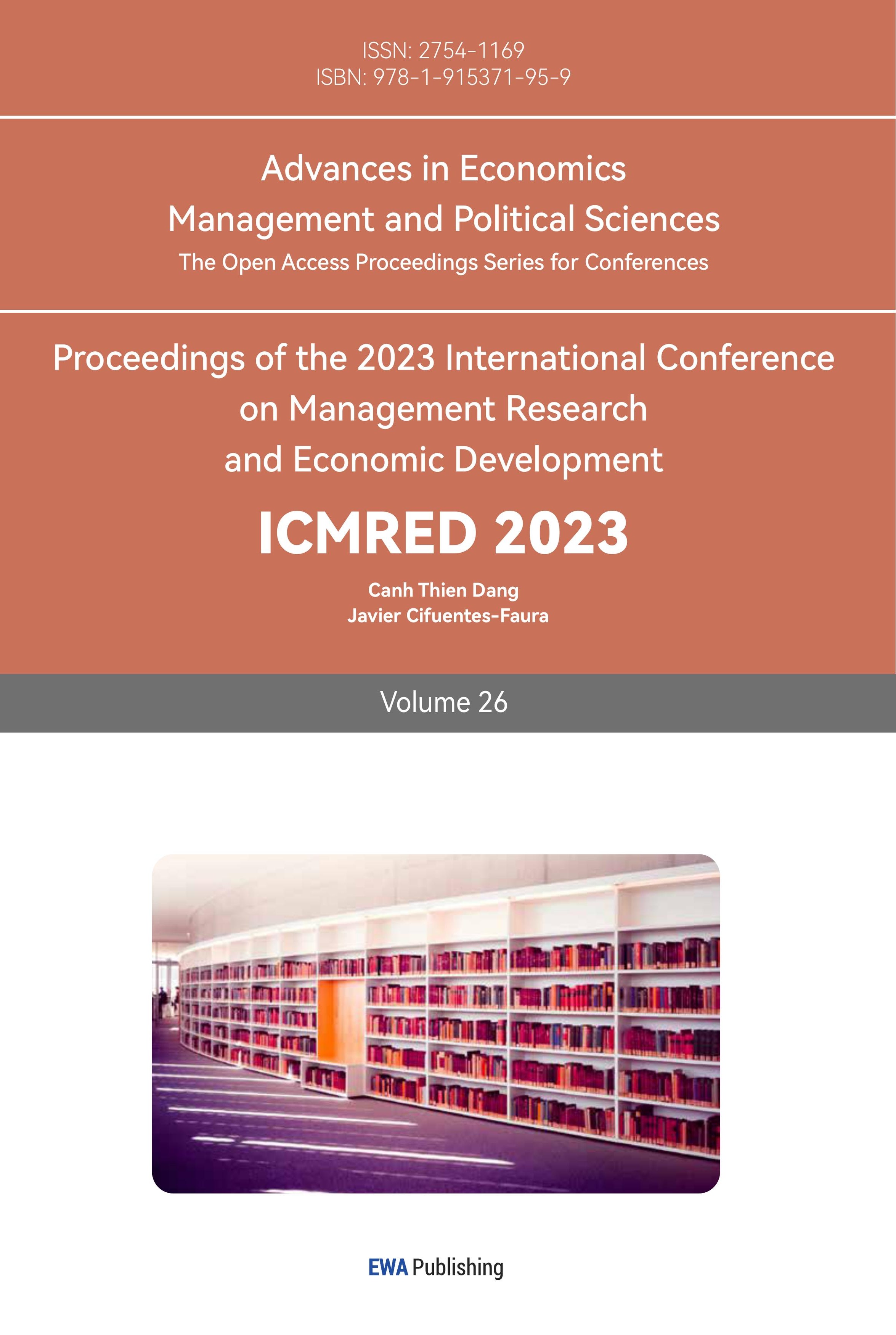References
[1]. Xing Li. Symbolic Value in Brand and Consumer Culture. Business Era, 2007,15,43-44
[2]. Bai Yuling. Symbolic Value Theory and Its Significance for Brand Marketing. Chinese Business Review. 2022,18,75-78
[3]. Kong Ming’an. From Consumption of Things to Symbolic Consumption - Baudrillard's Theoretical Study of Consumer Culture. Philosophical Research. 2002,11,68-74
[4]. Liu Shaojie. The Realistic Basis and Perceptual Choice of Symbolic Value Consumption. Exploration and Contention. 2018,9,58-64
[5]. Sha Zhenquan, Ye Zhanhui. The impact of customer identity on consumer flow experience based on the S-O-R model. industrial engineering. 2012,4,72-77
[6]. Philip Kotler and Gary Armstrong (written). Lou Zun (translated). Marketing: Principles and Practice. China Renmin University Press. Beijing. 131-132.2020
[7]. Hong Bo. Analysis of Consumer Purchase Behavior Decision Models in China. Journal of Yunnan University of Finance and Trade. 2006,5,43-45
[8]. Shi Yanping, Xiong Qiongyu. Research on Consumer Behavior Model Based on Sharing Perspective. Value Engineering. 2019,31,269-271
[9]. Wang Huinong. Five Patterns of Consumer Purchasing Behavior by Western Scholars. Foreign Social Sciences. 1993,4,21-25
[10]. Zhang Yan. Analysis of the Development Strategy of the Tea Drink Industry Based on the SWOT Model - Taking Honey Snow Ice City as an Example. Modern Marketing. 2022,27,68-70
Cite this article
Wang,W. (2023). A Study on the Influence of Sign Shaping on Consumption Intention —— Take Mixue Ice Cream & Tea for Example. Advances in Economics, Management and Political Sciences,26,175-186.
Data availability
The datasets used and/or analyzed during the current study will be available from the authors upon reasonable request.
Disclaimer/Publisher's Note
The statements, opinions and data contained in all publications are solely those of the individual author(s) and contributor(s) and not of EWA Publishing and/or the editor(s). EWA Publishing and/or the editor(s) disclaim responsibility for any injury to people or property resulting from any ideas, methods, instructions or products referred to in the content.
About volume
Volume title: Proceedings of the 2023 International Conference on Management Research and Economic Development
© 2024 by the author(s). Licensee EWA Publishing, Oxford, UK. This article is an open access article distributed under the terms and
conditions of the Creative Commons Attribution (CC BY) license. Authors who
publish this series agree to the following terms:
1. Authors retain copyright and grant the series right of first publication with the work simultaneously licensed under a Creative Commons
Attribution License that allows others to share the work with an acknowledgment of the work's authorship and initial publication in this
series.
2. Authors are able to enter into separate, additional contractual arrangements for the non-exclusive distribution of the series's published
version of the work (e.g., post it to an institutional repository or publish it in a book), with an acknowledgment of its initial
publication in this series.
3. Authors are permitted and encouraged to post their work online (e.g., in institutional repositories or on their website) prior to and
during the submission process, as it can lead to productive exchanges, as well as earlier and greater citation of published work (See
Open access policy for details).
References
[1]. Xing Li. Symbolic Value in Brand and Consumer Culture. Business Era, 2007,15,43-44
[2]. Bai Yuling. Symbolic Value Theory and Its Significance for Brand Marketing. Chinese Business Review. 2022,18,75-78
[3]. Kong Ming’an. From Consumption of Things to Symbolic Consumption - Baudrillard's Theoretical Study of Consumer Culture. Philosophical Research. 2002,11,68-74
[4]. Liu Shaojie. The Realistic Basis and Perceptual Choice of Symbolic Value Consumption. Exploration and Contention. 2018,9,58-64
[5]. Sha Zhenquan, Ye Zhanhui. The impact of customer identity on consumer flow experience based on the S-O-R model. industrial engineering. 2012,4,72-77
[6]. Philip Kotler and Gary Armstrong (written). Lou Zun (translated). Marketing: Principles and Practice. China Renmin University Press. Beijing. 131-132.2020
[7]. Hong Bo. Analysis of Consumer Purchase Behavior Decision Models in China. Journal of Yunnan University of Finance and Trade. 2006,5,43-45
[8]. Shi Yanping, Xiong Qiongyu. Research on Consumer Behavior Model Based on Sharing Perspective. Value Engineering. 2019,31,269-271
[9]. Wang Huinong. Five Patterns of Consumer Purchasing Behavior by Western Scholars. Foreign Social Sciences. 1993,4,21-25
[10]. Zhang Yan. Analysis of the Development Strategy of the Tea Drink Industry Based on the SWOT Model - Taking Honey Snow Ice City as an Example. Modern Marketing. 2022,27,68-70









